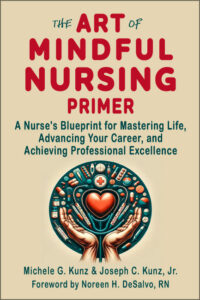Subtitle
How Setting Limits Can Protect Your Well-Being and Enhance Patient Care
Synopsis
This article explores the essential role boundaries play in maintaining nurses’ well-being and professional satisfaction. In the demanding world of healthcare, where the risk of burnout is ever-present, this article provides a comprehensive guide on how to set and maintain healthy boundaries. It delves into the challenges nurses face when establishing limits, such as guilt, fear of negative consequences, and cultural pressures while offering practical strategies for overcoming these obstacles. By understanding and implementing boundaries, nurses can protect their mental, emotional, and physical health, ensuring they can continue to provide high-quality care to their patients while enjoying a sustainable and fulfilling career.

Introduction
In the demanding landscape of modern healthcare, nurses frequently find themselves pushed to the brink, facing both physical and emotional challenges. The ever-growing demands of patient care and the constant pressure to deliver exceptional service can overwhelm even the most dedicated professionals. This relentless pace is not just a test of endurance but also a significant risk factor for burnout—a condition that can have severe consequences for nurses and their patients.
The concept of boundaries may seem abstract, but in the life of a nurse, it is a critical element of self-preservation. Boundaries are not about complaining, slacking off, or avoiding challenging assignments and patients. Instead, they are about recognizing your limits and protecting your capacity to care effectively. By setting and maintaining healthy boundaries, you can safeguard your well-being, build a sustainable career, and continue delivering the high-quality care your patients deserve.
There will undoubtedly be times when you must push beyond your boundaries—when the situation demands that you give a little more, stay a little longer, or handle a particularly challenging case. However, knowing when to push through and when to hold firm to your boundaries is key to preventing burnout and maintaining your ability to provide compassionate care in the long run.
This article will explore the importance of boundaries in nursing, why they are often difficult to establish, and practical strategies to implement and maintain them. Understanding and respecting your own limits is not a sign of weakness—it’s a powerful step toward a healthier, more balanced approach to your profession.
A. What Are Boundaries?
Boundaries are the personal limits we establish to protect our time, energy, and emotions. These limits are essential for maintaining a healthy balance between our professional responsibilities and personal well-being. In the context of nursing, boundaries help define what is acceptable and unacceptable in terms of workload, interpersonal interactions, and emotional labor.
Setting boundaries allows nurses to:
-
1. Protect Mental and Emotional Health: By setting clear limits on what you can handle, you prevent emotional overload and reduce the risk of compassion fatigue, which is common in healthcare professions.
2. Maintain Professional Integrity: Boundaries ensure that you can perform your duties effectively without being stretched too thin. They help you prioritize tasks that align with your role and expertise, ensuring that you provide the best care possible within your capacity.
3. Preserve Energy Levels: Nursing is physically demanding, and without boundaries, it’s easy to become exhausted. Setting limits on how much you take on helps preserve your energy, ensuring you can meet your responsibilities without compromising your health.
4. Enhance Personal Relationships: Boundaries help you manage your time, allowing for a healthier work-life balance. This balance is crucial for maintaining strong personal relationships and enjoying time with loved ones, which is vital for overall well-being.
5. Foster Professional Growth: By setting boundaries, you avoid burnout and create space for continuous learning and professional development. When you’re not overextended, you can focus on expanding your skills and knowledge.
Boundaries are not rigid walls but flexible guidelines that evolve as your circumstances change. They are tools for self-care and professional sustainability, ensuring that you can continue to provide high-quality care without sacrificing your own health and happiness.
B. Why Nurses Struggle with Setting Boundaries
Boundaries are challenging for many nurses due to internal and external pressures.
Some of the key reasons include:
-
1. Feeling Guilty or Selfish for Saying No: Many nurses feel an inherent responsibility to help others, leading to guilt when they refuse additional tasks or shifts. This guilt can be intensified by a culture that often equates self-sacrifice with dedication.
2. Fearing Negative Consequences: Nurses may worry that setting boundaries will lead to job loss, reduced opportunities for advancement, or criticism from supervisors and colleagues. This fear can be particularly strong in high-stress environments where staffing shortages are common.
3. Wanting to Be Seen as a Team Player: The desire to be perceived as reliable and committed can drive nurses to take on more than they can handle. They may fear that saying no will lead to being labeled as uncooperative or not a “team player.”
4. Having a Natural Inclination to Care for Others: Nursing attracts individuals who are naturally compassionate and empathetic. This caring nature can make it difficult to prioritize their own needs over the needs of others, leading to a reluctance to set boundaries.
5. Pressure from Management and Organizational Culture: In some healthcare settings, there is an unspoken expectation that nurses will go above and beyond, often without adequate support. This pressure can make it difficult for nurses to assert their limits.
6. Lack of Training on Setting Boundaries: Many nursing programs focus on clinical skills and patient care, but do not adequately address the importance of setting boundaries. Without guidance on how to navigate these challenges, nurses may struggle to establish and maintain their limits.
7. Fear of Letting Down Patients: Nurses often feel a deep commitment to their patients and may worry that setting boundaries will negatively impact patient care. This fear can prevent them from saying no, even when they are physically or emotionally exhausted.
8. Cultural and Social Expectations: Cultural norms and social conditioning can also play a role in boundary-setting difficulties. For example, nurses from cultures that emphasize selflessness and communal responsibility may find it especially hard to prioritize their own needs.
9. Difficulty Recognizing Personal Limits: Nurses may be so accustomed to pushing through fatigue and stress that they struggle to recognize when they have reached their limit. This lack of self-awareness can lead to taking on more than is manageable.
Understanding these nine challenges is the first step in overcoming them. By recognizing the factors that make boundary-setting difficult, nurses can begin to develop strategies to protect their well-being while still fulfilling their professional responsibilities.
C. Strategies for Setting and Maintaining Boundaries
Setting and maintaining boundaries is essential for preventing burnout and ensuring long-term success and satisfaction in your nursing career.
Here’s how to implement and sustain these boundaries effectively:
1. Identify Your Limits
The first step in setting boundaries is understanding your own limits. This involves a deep reflection on your workload, energy levels, and personal commitments. Consider the following steps:
-
a. Assess Your Current Workload: Take stock of the tasks, responsibilities, and shifts you are currently handling. Are you frequently working overtime? Do you find yourself constantly exhausted? Identifying these patterns will help you recognize when you’re taking on too much.
b. Evaluate Your Energy Levels: Pay attention to how you feel throughout the day. Are there particular tasks or times of day that drain you more than others? Understanding your energy highs and lows can help you plan your work more effectively.
c. Consider Your Personal Life: Your life outside of work is just as important as your professional duties. Reflect on how much time and energy you need for personal activities, family, and rest. Balancing work with these aspects of your life is crucial for your overall well-being.
d. Set Clear Priorities: Once you’ve identified your limits, prioritize your tasks. Determine which responsibilities are essential and which can be scaled back or delegated. Being clear about what matters most will help you stay focused and avoid overcommitting.
By thoroughly understanding your limits, you can make informed decisions about allocating your time and energy effectively. This awareness allows you to prioritize your tasks, ensuring a balanced approach to your personal and professional life.
2. Practice Self-Care
Self-care is not a luxury; it’s a necessity, especially for those in demanding professions like nursing. Regular self-care practices are vital for maintaining your physical and emotional health.
Here’s how to make self-care a non-negotiable part of your routine:
-
a. Incorporate Physical Activity: Regular exercise is a powerful way to boost your energy levels and reduce stress. Whether it’s a morning jog, yoga, or a simple walk, find an activity that you enjoy and make it a regular part of your routine.
b. Embrace Mindfulness and Meditation: Mindfulness practices, such as meditation or deep breathing exercises, can help you manage stress and stay grounded. Even a few minutes a day can make a significant difference in your mental clarity and emotional resilience.
c. Engage in Hobbies: Hobbies provide a creative and fulfilling outlet that can recharge your mind and spirit. Whether it’s reading, painting, gardening, or cooking, make time for activities that bring you joy and relaxation.
d. Ensure Adequate Rest: Sleep is essential for recovery and maintaining optimal functioning. Prioritize getting enough sleep each night, and don’t hesitate to take short breaks or naps when needed. Listen to your body and give it the rest it deserves.
e. Nourish Your Body: A balanced diet is fundamental to your well-being. Pay attention to your nutrition, staying hydrated, and eating meals that fuel your body and mind. Avoid skipping meals or relying on caffeine to get through the day.
Making self-care a priority is essential for sustaining your energy and emotional resilience as a nurse. By integrating these practices into your daily routine, you ensure that you’re well-equipped to handle the demands of your profession while maintaining your overall well-being. Remember, taking care of yourself is the foundation for caring for others.
3. Seek Support from Colleagues and Supervisors
Open communication is key to establishing and maintaining boundaries. By engaging in honest conversations with your colleagues and supervisors, you can find solutions that support both your needs and the needs of your team
Here are four ways to seek support:
-
a. Initiate the Conversation: Don’t wait until you’re overwhelmed to discuss your boundaries. Proactively speak with your supervisor about your workload and any concerns you have about overextending yourself. This can help prevent issues before they escalate.
b. Be Honest About Your Needs: Clearly communicate your limits and explain why they are necessary for your well-being. For example, you might say, “I’m finding it difficult to maintain my energy levels with my current shift pattern. Is there any flexibility in scheduling that could help?”
c. Collaborate on Solutions: Work together with your supervisor to find a solution that works for everyone. This might involve adjusting your schedule, redistributing tasks, or bringing in additional support when needed.
d. Build a Support Network: Connect with your colleagues and form a support network. Share your experiences and strategies for setting boundaries. Having allies in your workplace can make it easier to maintain your limits and advocate for yourself.
Proactively seeking support and maintaining open communication creates a collaborative environment where your boundaries are respected and reinforced. This approach protects your well-being and enhances teamwork, ensuring a more balanced and effective workplace for everyone.
4. Delegate When Possible
Delegation is a powerful tool for managing your workload and maintaining boundaries. It lightens your load, empowers your colleagues, and contributes to a more collaborative work environment.
Here are four ways to delegate:
-
a. Recognize What Can Be Delegated: You do not need to do every task. Identify tasks others can handle, such as routine procedures, administrative duties, or patient education, and delegate accordingly.
b. Trust Your Colleagues: Delegation requires trust. Have confidence in your colleagues’ abilities to handle the tasks you assign to them. This trust fosters a more collaborative and supportive environment.
c. Provide Clear Instructions: When delegating, ensure that you provide clear and concise instructions. This reduces the likelihood of mistakes and helps your colleagues feel confident in their ability to complete the task.
d. Follow Up Without Micromanaging: After delegating a task, follow up to ensure it’s completed, but avoid micromanaging. Trust your team to handle the task and focus on your own responsibilities.
Effective delegation allows you to manage your workload more efficiently while empowering your colleagues and fostering a supportive, collaborative environment. By delegating tasks appropriately, you can focus on your priorities and maintain the boundaries necessary for your well-being and professional success.
5. Monitor and Adjust Your Boundaries Regularly
Boundaries are not static; they need to be regularly assessed and adjusted as your workload and responsibilities change.
Here’s how to stay on top of your boundaries:
-
a. Regularly Reflect on Your Limits: Schedule regular check-ins with yourself to evaluate how your boundaries are holding up. Are you feeling overwhelmed? Have you taken on more than you initially planned? Use these reflections to adjust your boundaries as needed.
b. Be Flexible: Life is unpredictable, and so are the demands of nursing. Be prepared to adapt your boundaries when necessary. For example, during particularly busy periods, you might need to temporarily adjust your limits, but make sure to return to your established boundaries as soon as possible.
c. Seek Feedback: Don’t hesitate to seek feedback from trusted colleagues or mentors on how well you’re maintaining your boundaries. They can offer valuable insights and support as you navigate challenges.
d. Reassess Your Priorities: As your career progresses, your priorities may change. Regularly reassess what is most important to you and adjust your boundaries accordingly. This might mean saying no to additional shifts, focusing more on professional development, or dedicating more time to your personal life.
By implementing these five strategies, you can establish and maintain boundaries that protect your well-being, allowing you to thrive both personally and professionally. Remember, setting boundaries is not a one-time task but an ongoing process that requires attention and care.
Conclusion
Setting and maintaining boundaries is not just a professional skill—it’s a lifeline that ensures your longevity and satisfaction in the nursing field. Boundaries allow you to protect your mental, emotional, and physical health, creating the space you need to recharge and bring your best self to work each day. They empower you to manage your workload effectively, maintain meaningful relationships, and continue growing both personally and professionally.
As you navigate the challenges of your nursing career, remember that boundaries are not barriers; they are essential tools for creating a sustainable and fulfilling work-life balance. Start today by reflecting on your personal and professional limits, communicating openly with your colleagues and supervisors, and prioritizing self-care.
By doing so, you will not only protect your own well-being but also enhance the quality of care you provide to your patients. A nurse who respects their own boundaries is better equipped to respect the boundaries of others, fostering a healthier and more supportive healthcare environment. Your health, happiness, and professional satisfaction depend on it. Embrace the power of boundaries, and let them guide you toward a more balanced, rewarding career in nursing.
Ready to Bring Mindfulness into Your Nursing Practice?
 If you’re looking to deepen your understanding of mindfulness and discover practical ways to incorporate it into your daily routine, The Art of Mindful Nursing Primer is the perfect resource.
If you’re looking to deepen your understanding of mindfulness and discover practical ways to incorporate it into your daily routine, The Art of Mindful Nursing Primer is the perfect resource.
This book offers insightful strategies, real-world applications, and easy-to-follow techniques designed specifically for nurses. Empower yourself, reduce stress, and enhance the care you provide—one mindful moment at a time.
Check out The Art of Mindful Nursing Primer today!
Empowering yourself with boundaries is not about limiting what you can do—it’s about protecting your ability to do it all with compassion, clarity, and strength. Remember, you can’t pour from an empty cup, so fill yours first. —MK


